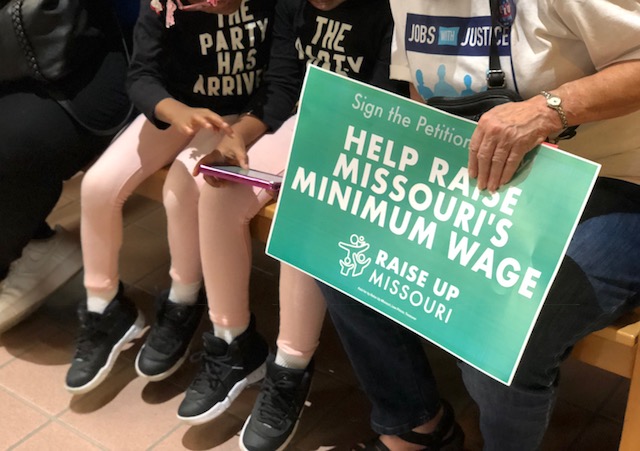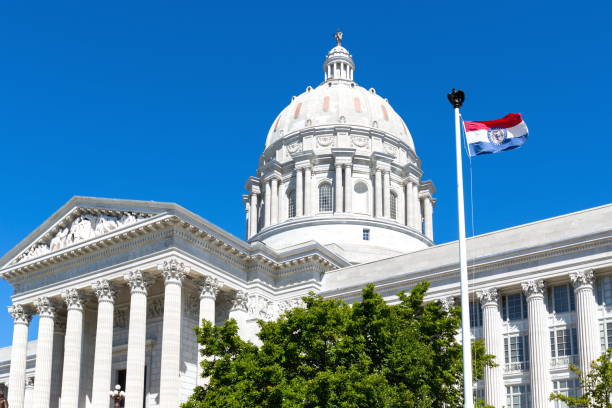Minimum wage workers in Missouri got an 85-cent raise as of Jan. 1 after the minimum wage increased from $8.60 an hour to $9.45 an hour.
The increase in the minimum wage is part of the annual scheduled raises under Proposition B, which statewide voters passed 62.3 percent to 37.7 percent in November 2018. The federal minimum wage has been $7.25 an hour since July 24, 2009 — the longest period in history without a raise.
Under the ballot measure, the minimum wage in Missouri will increase every year for five years until it reaches $12 an hour in 2023. After hitting $12, future adjustments will then be made based on changes in the Consumer Price Index.
Jan. 1, 2019 saw the first scheduled increase, from the state’s previous minimum wage of $7.85 to $8.60 an hour. From there, it will increase 85 cents every year until 2023.
Some employees and businesses are exempt from the mandatory wage increase, including tipped employees, who must be paid at least half of the current minimum wage, any businesses doing gross annual sales or business of less than $500,000, government employees and most agricultural and farm employees.
Raise Up Missouri, the organization behind the ballot initiative, collected more than 120,000 signatures in early 2018 from residents in every county in the state to place the petition on the ballot to change state law. Any initiative that would change state law must gather at least 100,000 signatures from registered voters in six of Missouri’s congressional districts.
The proposition earned the support of regional business owners such as Pizza Head in south St. Louis city, Urban Chestnut Brewing and Joe Edwards, who owns multiple businesses up and down the Delmar Loop like The Pageant and Blueberry Hill.
Others who supported the proposition included elected Democratic officials like St. Louis Mayor Lyda Krewson, former St. Louis County Executive Steve Stenger and former Sen. Claire McCaskill.
Prior to 2017, local governments had the ability to set local minimum wages higher than the statewide minimum wage, such as in 2015 when the St. Louis Board of Aldermen passed an ordinance that would have increased the city’s minimum wage each year until reaching $11 in 2018. However, House Bill 1194, passed by the state legislature in 2017, preempted municipal minimum wage ordinances, meaning that local governments could no longer set local minimum wages higher than the state’s. The passage of Proposition B does not affect HB 1194, meaning municipal governments are still barred from raising local minimum wages higher than the state’s minimum.
Nationwide, 21 states got higher minimum wages in 2020. Advocates for the hikes say that a higher minimum wage will boost consumer spending, reduce costly employee turnover, increase productivity and customer satisfaction and strengthen local economies.
Six states with the hikes are set to reach $15 an hour in the coming years — Illinois, California, Maryland, Massachusetts, New Jersey and New York. New York City required a $15 an hour minimum as of Dec. 31.
Laurie Knowlton, owner of Pickwick Underground Framing and Zen3 Spa and Bodyworks in Springfield, said of the higher minimum wage in a news release, “Raising the minimum wage will increase employee morale, retention and productivity. And when the staff is more stable, it builds trust and helps businesses maintain a positive reputation. With a higher minimum wage, workers will earn more and spend more – creating more cash flow for local businesses and communities.”
Scheduled increases for Dec. 31, 2019 and Jan. 1, 2020 include:
- Arizona increases to $12 on Jan. 1, 2020 and is indexed for annual cost of living increases starting in 2021
- Arkansas increases to $10 on Jan. 1, 2020 and $11 in 2021
- California increases to $13 on Jan. 1, 2020, $14 in 2021 and $15 in 2022. Small businesses with 25 employees or fewer have an extra year to comply, reaching $15 in 2023. After the minimum wage reaches $15 for all employees, it will be indexed for annual cost of living increases.
- Colorado increases to $12 on Jan. 1, 2020 and indexed starting in 2021
- Illinois increases to $9.25 on Jan. 1, 2020, $10 on July 1, 2020, $11 on Jan. 1, 2021, with future increases of $1 a year to reach $15 by 2025
- Maine increases to $12 on Jan. 1, 2020 and indexed starting in 2021
- Maryland increases to $11 on Jan. 1, 2020, with future increases to reach $15 in 2025. Small businesses with fewer than 15 employees reach $11 on Jan. 1, 2020, with future increases to reach $15 on Jan. 1, 2026.
- Massachusetts increases to $12.75 on Jan. 1, 2020, with increases of 75 cents a year to reach $15 in 2023
- Michigan increases to $9.65 on Jan. 1, 2020, with future small increases until it reaches $12.05 in 2030, “or a subsequent calendar year”
- Missouri increases to $9.45 on Jan. 1, 2020, with future increases of 85 cents a year to reach $12 in 2023 and then indexed
- New Jersey increases to $11 on Jan. 1, 2020, with future increases of $1 a year to reach $15 by 2024 and then indexed. Businesses with fewer than six employees increase to $10.30 on Jan. 1, 2020 and then rise more slowly to $15 in 2026.
- New Mexico increases to $9 on Jan. 1, 2020, with future increases to $12 in 2023
- New York
- New York City increases to $15 on Dec. 31, 2019 for businesses with 10 employees or fewer, putting all businesses in New York City at $15
- Long Island and Westchester increase to $13 on Dec. 31, 2019, $14 in 2020 and $15 in 2021
- The rest of New York State increases to $11.80 on Dec. 31, 2019 and $12.50 on Dec. 31, 2020. Annual increases starting in 2021 will bring the rest of New York to $15 on a schedule to be determined based on cost of living and other indices.
- Washington state increases to $13.50 on Jan. 1, 2020 and indexed for annual cost of living increases starting in 2021
States with indexing where annual cost of living adjustments will take effect Jan. 1, 2020 include:
- Alaska increases to $10.19
- Florida increases to $8.56
- Minnesota increases to $10
- Montana increases to $8.65
- Ohio increases to $8.70
- South Dakota increases to $9.30
- Vermont increases to $10.96
Looking ahead, Nevada, Oregon and the District of Columbia have increases scheduled for July 1, 2020 and Connecticut will raise its minimum wage on Sep. 1, 2020. D.C.’s minimum wage will reach $15 in July 2020 and Connecticut is phasing in a $15 minimum wage by 2023.
On July 18, the Democratic-controlled U.S. House of Representatives passed the Raise the Wage Act, which would increase the federal minimum wage to $15 by 2025, but the Republican-controlled Senate has not acted.


















